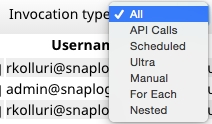Fall 2015 Launch Updates (4.3.0)
In this Page
Live on production October 24, 2015.
Before You Begin
You may need to clear your browser cache before you log into the latest SnapLogic Elastic Integration Platform.
See the appropriate documentation for your browser:
You may see an Upgrade Notice dialog informing you that you will be logged out immediately to complete the update process. Because the SnapLogic Elastic Integration Platform consists of multiple applications, you will likely see this message multiple times.
Enhancements
- Account Statistics: determine which pipelines in an organization are using a particular account.
- UI Improvements:
- Rows within tables in Snap properties can now be rearranged. Mouse over a row to see the grabber appear on the left.
- A search within the Snap catalog now automatically expands all Snap Pack or Type groups.
- The catalog panel is now resizable.
- You can now click and drag pipeline tabs within Designer to rearrange the tabs.
- Snap Statistics now shows the Total Pipelines used per Snap Pack. Additionally, a refresh button has been added.
- In Dashboard > Pipeline > Pipeline Execution History, the list of Invocation types that you can filter by has been expanded.
- Rows within tables in Snap properties can now be rearranged. Mouse over a row to see the grabber appear on the left.
- You can now create tasks for the current pipeline within Designer.
- Expression Language: .repeat() is now available for strings.
- Triggered Tasks now support bearer token authentication.
- SnapReduce
- Users can now load additional jar files into a Snaplex.
- Users can now pass extra vm options to a Hadooplex.
- The SnapReduce user impersonation functionality lets SnapLogic to proxy as the user executing the pipeline.
- Spark Snap.
- Public Monitoring API: last_hours now has a limit of 2160 hours (90 days).
Snaps
For information on Snap updates, see the Fall 2015 section of Snap Updates, 2015.
Migration Impacts
None
Known Issue
In Lifecycle Management, a task created in a target phase appears to be deleted after the second promote. Workaround: Create the task manually in the target phase after promote or create it in source phase before promote.
Have feedback? Email documentation@snaplogic.com | Ask a question in the SnapLogic Community
© 2017-2024 SnapLogic, Inc.
.png?version=1&modificationDate=1492797388647&cacheVersion=1&api=v2&width=770&height=250)
.png?version=1&modificationDate=1492797391812&cacheVersion=1&api=v2)
